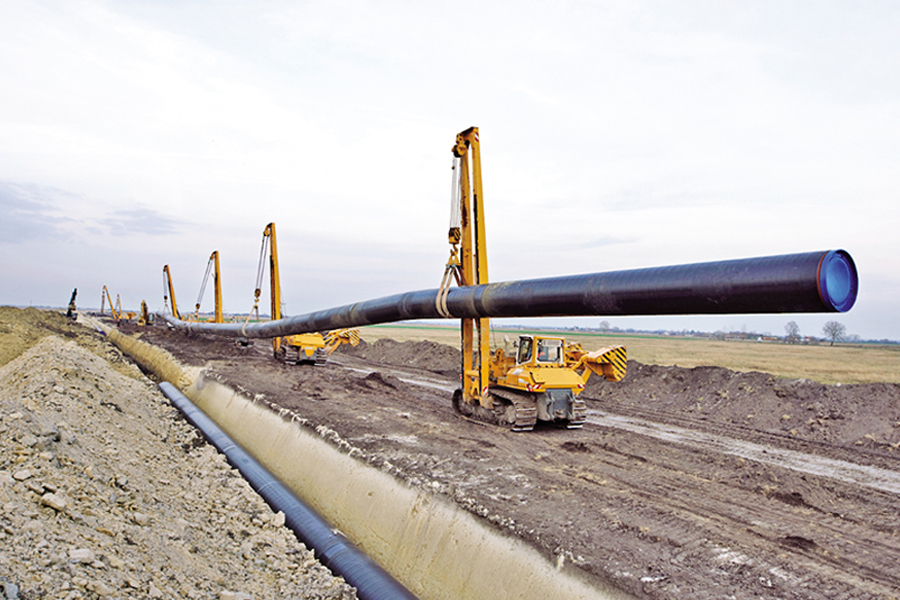
Published :
Updated :

Bangladesh Petroleum Corporation (BPC) finally started its commercial operation for transporting fuel oil (diesel) from Chattogram (Padma Oil Company's dispatch terminal at Guptakhal, Patenga) to Dhaka (Godnail, Narayanganj) with its 249.42 km long pipeline. Energy Adviser Mohammad Fauzul Kabir Khan inaugurated the oil transportation on August 16, 2025. BPC and Energy Division officials consider that the pipeline transportation of diesel from Chattogram to Naraynaganj will bring 'revolutionary changes' in the fuel oil supply systems by reducing time (as per estimates the supply time for transportation of fuel oil from Patenga to Godnail will drop from average 48 hours to 12 hours) and cost (BPC anticipates the savings will be Taka 226 crores annually), enhance efficiency and supply security. BPC officials hope that the oil transportation pipeline will help prevent theft and wastage, ease pressure and environmental pollution on roads and river transportation routes. The pipeline is designed for securing fuel oil transportation in an efficient way (even under adverse situations like road blocks, unrests, and extreme weather conditions). Prior to the pipeline operations fuel oil was transported from Patenga to Narayanganj using river and road transport systems. BPC sources report that the fuel oil transportation from Patenga to Naraynaganj previously involved more than a hundred inland water oil tankers and the transportation time was at least 48 hours.
The pipeline consists of 241.28 km 16 inch diameter mainline from Patenga to Godnail via Feni, Cumilla, Chandpur and Munshiganj. An additional 8.29 km 10 inch diameter connecting pipeline links the pipeline from Godnail to Fatulla, Narayanganj. The pipelines are mostly laid underground. Along the route, the pipeline crossed 22 rivers and canals including 10 major rivers. The river crossings are mostly done beneath the riverbeds for securing safety and durability of the pipelines. For transportation of diesel oil through the pipelines, fully automated pipeline operation systems have been installed. In addition modern oil depot has been set up in Mogbari of Cumilla's Barua Upazila, nine stations along the way, and several new storage tanks have been installed in Narayanganj for Padma, Meghna and Jamuna oil companies under BPC. The oil transportation pipeline has the installed capacity for carrying 350 tonnes of diesel per hour. The pipeline can move 2.7-3 million tonnes of oil annually with the potential to expand to 5 million tonnes annually. BPC sources inform that the pipeline operators can monitor oil flow and ensure the operational security across the entire pipeline route sitting at the control room set up in Patenga, Chattogram.
BPC implemented the pipeline construction project at a cost of Tk 3,636 crore. The pipeline construction project was initially approved by the Executive Committee of National Economic Council (ECNEC) in October 2018 at an initial cost of Taka 2,861 crore and was scheduled for completion in December 2020. For various reasons, the construction was delayed pushing the timeline (three deadlines for completion of constructions works had been set earlier and finally the work was completed in March 2025) and expenditure for project implementation. Different contractors had been engaged for the pipeline and its associated construction works under the supervision of the 24th Engineering Construction Brigade of the Bangladesh Army.
BPC sources believe that the pipeline project will generate Taka 3.26 billion annually by carrying fuel oil from Patenga to Narayanganj (at Godnail and Fatulla). On the contrary, its annual operational costs are estimated at Taka 900 crores securing Taka 2.36 billion savings (excluding maintenance costs) annually. It is estimated, that the project implementation costs will be recovered fully within 16 years from the commencement of the pipeline operation.
As per published data, BPC imported 6.37 million tonnes of liquid fuel oil in the Fiscal Year 2023-2024 including approximately 1.3 million tonnes of crude oil. As per BPC information, there are annual demands of approximately 4.6 million tonnes of diesel in the country. Dhaka and its adjacent areas consume approximately 1.5 million tonnes of fuel oil a year. Diesel has been used mainly (50 per cent) in transport sectors followed by in power sector(24 per cent), agriculture sector (17 per cent), industry sector (5 per cent) the balance in domestic (4 per cent) and other (1 per cent) sectors. Published information suggests that BPC planned to import 5.91 million tonnes of refined and 1.4 million tonnes of crude oil for the current fiscal year. BPC meets its 80 per cent of annual diesel demands from imported refined diesel oil. Apart from Indian diesel import, BPC imports refined fuel oils including diesel from other sources like China, Indonesia, Malaysia, Thailand, United Arab Emirates and Oman.
BPC import plan for the current year includes 130,000 tonnes of diesel from India's Numaligarh Refinery Limited through Indo-Bangladesh Friendship Pipeline (the cross border 131.57 km long pipeline connecting Numaligarh, Siliguri (West Bengal, India) and Parnatipur, Dinajpur. The pipeline has a capacity to transport one million tonnes of diesel annually. The facilities for oil transportation through this cross border pipeline started operation from 18 March 2023). BPC reports suggest that the cost of diesel import through the Siliguri-Parbatipur pipelines for northern districts of the country is efficient and cost saving compared to other alternatives.
Encouraged by the advantages of pipeline transportation of oil, BPC has been implementing a few more pipelines (59.23 km long and 8 inches diameter for transporting diesel from Cumilla to Chandpur, 17 km long pipelines for transporting jet oil from Pitalganj near Kanchan bridge of Shitalakhya river to Kurmitola (near Hazrat Shahjalal International Airport). It is important that these important pipeline projects are made operational on time for maximising benefits and securing safe supply of fuel oil.
Mushfiqur Rahman is a mining engineer. He writes on energy and environment issues.


 For all latest news, follow The Financial Express Google News channel.
For all latest news, follow The Financial Express Google News channel.